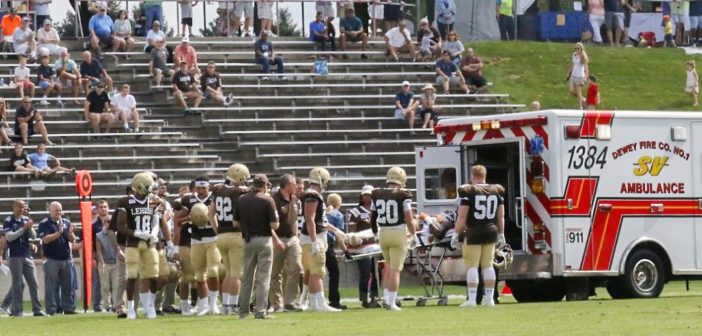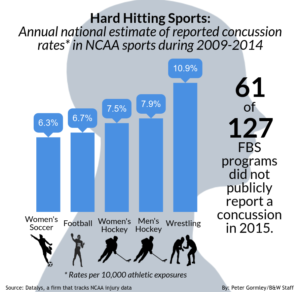In the first 10 weeks of the season, the Lehigh football team has been plagued by severe head and neck injuries, with three players taken off the field in ambulances.
Junior defensive back Donavon Harris was one of those players who suffered a concussion after attempting a tackle during a game against Yale University on Sept. 16.
“It just happens, people are flying around fast,” Harris said. “It’s a part of the game.”
Marco Giuliani, the associate director of sports medicine and a licensed trainer, said head injuries are unlike any other injury football players sustain.
“Right now there is no equipment, there are no exercises that can prevent a concussion,” Giuliani said, “and the best thing right now is to be properly educated on what a concussion is, how it can be sustained and how to detect it.”
So far this year, the football team has had multiple players carted off the field with head injuries, but that number alone does not depict the number of concussions that the football team and all of Lehigh sports have sustained.
Jack Foley, the director of sports medicine, said compared to previous years, the number of concussions has decreased significantly, something both Foley and Giuliani credit to their extensive research and education on concussions.
Under Lehigh’s new concussion protocol, anytime an athlete goes unconscious because of a head injury —whether it’s for minutes or seconds — they are immediately taken to a hospital.
Harris, who had a brief blackout, said after the hit he does not remember anything and woke up surrounded by a group of people.
“(With) most injuries, there are things that you can tell to recognize how serious it is,” Giuliani said. “With concussions and head injuries, there is no telling how severe the trauma is, so we feel as if getting them medical attention is required immediately.”
Giuliani and Foley, along with other licensed athletic trainers at Lehigh, are constantly reviewing their concussion protocol and updating it every three to six months. Additionally, they continue to educate themselves, and Foley has participated in concussion research.
Their main goal is to ensure that the trainers, coaches and players are educated, and by doing so, they’ve been able to recognize concussions. A few of the diagnoses this year came from teammates of the players who suffered concussions.
Giuliani and Foley said their main concern is preventing future concussions in players who have already sustained head injuries. Especially in football, multiple concussions can impact players’ futures and even lead to Chronic Traumatic Encephalopathy, or CTE.
“I think (Giuliani) and Ryan (Lynch, the assistant director of sports medicine) did a great job just telling me to be patient because it’s my head,” Harris said. “You only get one brain, you only get one opportunity. The one thing that really hit home for me (was when Giuliani said), ‘Ten years from now I want to see little Donavons running around and you playing with them.'”
The main thing Giuliani preaches is rest. He wants to ensure each player is taking the process slowly and not rushing back onto the field.
“Each players’ head is different, and some players can take one week to be back on the field and some could take three,” Giuliani said. “Understanding this, we have to treat every head injury like it’s unique and closely follow our protocol.”
For Harris, the most difficult part of the injury was being away from the team in the early stages of recovery.
“It was very frustrating just not being able to be around the guys,” Harris said. “I know it’s like five stages you need to go through and once you get to phase four and phase five, then you can finally go back to meetings. This was my first week being able to go back to meetings, and it just felt good to be around the team again.”
As for Giuliani and Foley, their daily task is to continue educating and evaluating both long-term and short-term risks to protect the student athletes who step onto the field in a Lehigh uniform.







Comment policy
Comments posted to The Brown and White website are reviewed by a moderator before being approved. Incendiary speech or harassing language, including comments targeted at individuals, may be deemed unacceptable and not published. Spam and other soliciting will also be declined.
The Brown and White also reserves the right to not publish entirely anonymous comments.